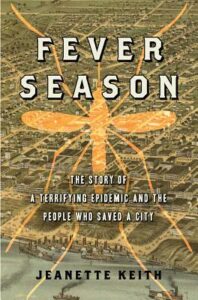 Fever Season: The Story of a Terrifying Epidemic and the People Who Saved a City, Jeanette Keith
Fever Season: The Story of a Terrifying Epidemic and the People Who Saved a City, Jeanette Keith
My interest in this book was mostly from a scientific perspective, rather than the historical, but it seems that there weren’t many scientific takeaways from this epidemic — or at least, this book isn’t interested in discussing them, though it briefly mentions that there were scientists and doctors in Memphis during the outbreak who tried to get what information they could.
Fever Season is more a historical chronicle, an attempt to draw together eye-witness accounts and historical events and make a record of the suffering and death the city suffered, with some nods to how that later influenced Memphis’ growth as a city. Keith writes with quiet sympathy for the major players, identifying the people who stayed, who did their best to combat the suffering. The discussion of the nurse Kezia DePelchin in particular is very sympathetic, showing her sadness, the ways she suffered as an onlooker.
It’s a fairly dry narrative, all the same, and it assumes at least some pre-existing knowledge about Memphis and the political situation in the US in that period. Nothing a bit of Googling couldn’t teach me, but that and the dryness made it heavy going in some ways.

Oddly enough, I know the history and politics of the period, but didn’t know about the epidemic! An earlier one in New Orleans features in the Bette Davis film “Jezebel” (1938), and I wonder how well the film depiction matches up with history. New Orleans had a strange social structure built around yellow fever immunity, but I don’t think Memphis did? As I’m more interested in the history than the science, maybe I should add this one to my TBR even if it’s dry.
People in Memphis at the time definitely had an expectation that people of particular descent would automatically be immune (because they didn’t fully understand that immunity was conferred by prior infection, and they didn’t always know how to recognise prior infection — immunity was expected to be conferred wholly or partly on racial lines). I don’t know enough about New Orleans then to compare the two, though…
It might be less heavy-going for you, given we have slightly different focus in our interests going in!
New Orleans had a very complex social order around perceived immunity, though it wasn’t entirely consistent. They seem to have been slightly better about recognizing prior infection as conferring immunity, but they still thought Southerners were more immune than Northerners, etc etc. I suspect it was more developed than Memphis’s, since yellow fever made an annual appearance in New Orleans, whereas it was much less frequent in Memphis. The New Orleans “acclimated” social pecking order was also severely restricting, and New Orleans was the place to make your fortune, so that immigrants would purposely try to catch yellow fever in a terrifying gamble for access to better jobs and better neighborhoods.